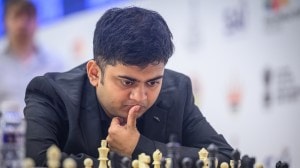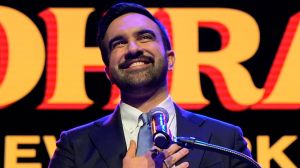The silent successor
Perhaps the first thing Ramesh Chandra Sharma did after occupying the chair of Director, the Central Bureau of Investigations (CBI), was re...

Perhaps the first thing Ramesh Chandra Sharma did after occupying the chair of Director, the Central Bureau of Investigations (CBI), was remove the Xerox machine from the room.
It was the machine that his predecessor allegedly used for “systematically leaking” information.
An antithesis of his flamboyant predecessor, media-wary Sharma has often taken refuge in the plea that media scrutiny hampers his work. Accessible, he is, but taking the cue from the rather unceremonious exit of Joginder Singh, Sharma is trying to do what Singh had declared before the Supreme Courtto become a total recluse. The contrast between the two is not just in the attitude towards the Press but even in the style of functioning.Learning a lesson from the criticism Singh drew for calling on politicians of every hue immediately after taking over, Sharma called on only the Minister of State for Personnel on his first day in the new office. Later, he proceeded to hold a series of meetings with his officers. Courtesy calls were reserved for the next day. Sharma’s detractors, however, see it as an expression of his “pro-establishment attitude” and to drive home the point, they cite an instance where Sharma spoke out in favour of the controversial single-point directive at a CBI conference.
Controversies frequented Sharma regularly. His handling of high-profile cases such as Bofors and the HDW submarine deal came under a cloud, so did his uneasy truce with his erstwhile boss Joginder Singh and his promotion as the CBI chief during an extension. Says BJP leader Yashwant Sinha: “The transfer of Joginder Singh was essentially a political transfer to keep Laloo (Prasad Yadav) in good humour. And the choice of R.C. Sharma is politically convenient for Congress which is facing the heat in Bofors and Rs 4,600-crore nationalised bank scam. Moreover, the timing of the transfer makes it even more suspect.”
A true blue product of the cast iron bureaucracy, Sharma prefers to play strictly by the booka practice which fetched him both bouquets and brickbats. While within the organisation he is respected for being a hard-core professional, outside he has earned the ire of the media and politicians alike for adopting dilatory tactics in politically sensitive cases. He was accused of sitting on the Bofors case for five years.Criticised for his proximity to certain Congress leaders, Sharma shrugs it off as a professional hazard as one will always have political bosses. On the Bofors probe, his defence is that when he took over the case two years had gone by and the case had reached a near dead-end. He says the CBI had lost all the cases in the High Court and the Swiss government had closed the inquiry. Instead of sabotaging, Sharma says, he revived the case but it went unnoticed as he didn’t “make any noise about it”.
Says former CBI director Vijay Karan who had transferred the case to R.C. Sharma, “There was no political pressure and neither is Sharma amenable to political machinations. But I do have reservations about the timing of the appointment of new director in the absence of his predecessor”.
Though Sharma by and large commands unflinching loyalty within his own organisation, evident in the way his taking over was celebrated by peons and officers alike, he has his fair share of detractors outside the agency.
“His transfer of N.R. Wasan who was heading the Bofors team soon after taking over is very disquieting,” observed a senior government official.
The Sharmas moved from west Pakistan to Delhi during partition when Ramesh Chandra was seven. He had his schooling in the Capital and went to Chandigarh for college. That was where he came across a teacher who became an “abiding influence in his life.” He wanted to be an economist like his professor, former Finance Minister Manmohan Singh, but was nudged into a career in the services by his mother who didn’t want him to go abroad or face financial hardships.
The “reluctant cop” donned the uniform in 1963. Handpicked by K.F. Rustamji, founding father of the Border Security Force, Sharma, then 28, became the BSF’s youngest commandant, an assignment which he still considers one of his best.
Among the other posts he held were that of the SP, Shah Commission, Director, Police Training College, Karnal — where he trained the first batch of women recruitsand that of Additional Commissioner of the Special Investigative Team probing the assassination of Indira Gandhi.
A fitness freak, Sharma devotes a couple of hours every day to his favourite sport, golf. An avid reader, he likes Urdu poetry and he has even written a book on police training. For Sharma, the most important posting came after his career was over, almost. However, his elevation as the chief of the country’s premier investigative agency is being seen inside the CBI headquarters as a “belated recognition”.
The transfers he ordered and his statement that arrests would be made an exception and not the rule, may have already sent political signals. But his coming seven months in the office under the unrelenting surveillance of the Opposition and the media are not going to be easy especially if the agenda is, as Sharma says, is “follow the book.”



- 01
- 02
- 03
- 04
- 05




























